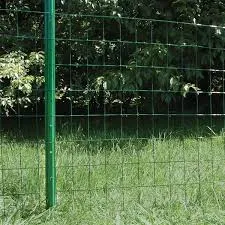Understanding Soft Annealed Iron Wire Properties, Applications, and Benefits
Soft annealed iron wire is a versatile and widely used material in various industries, prized for its unique properties and characteristics. This article explores the properties of soft annealed iron wire, its applications across different sectors, and the benefits that make it a popular choice among manufacturers and craftsmen.
What is Soft Annealed Iron Wire?
Soft annealed iron wire is made from low-carbon steel that has undergone a specific heat treatment process known as annealing. Annealing involves heating the wire to a high temperature and then allowing it to cool gradually. This process reduces internal stresses, enhances ductility, and improves the wire's overall flexibility. As a result, soft annealed iron wire exhibits an excellent balance of strength and malleability, making it suitable for a wide range of applications.
Properties of Soft Annealed Iron Wire
1. Ductility One of the most notable properties of soft annealed iron wire is its high ductility. This means it can be easily stretched or bent without breaking, allowing for intricate designs and formations. This property is essential in applications where the wire needs to be manipulated into specific shapes.
2. Malleability Malleability refers to the wire’s ability to be hammered or pressed into thin sheets without cracking. The soft nature of annealed iron wire provides ample malleability, making it easy to work with during manufacturing processes.
3. Strength While it is soft, the wire still maintains a certain level of strength, making it capable of handling various loads and stresses. This strength is particularly beneficial in constructions where structural integrity is crucial.
4. Corrosion Resistance Soft annealed iron wire, when properly coated or treated, can exhibit good resistance to corrosion. This makes it suitable for outdoor applications or areas where moisture may be present.
5. Cost-Effectiveness Soft annealed iron wire is relatively inexpensive to produce compared to other types of metal wires, making it an economical choice for many applications.
Applications of Soft Annealed Iron Wire
Soft annealed iron wire finds use in multiple industries due to its favorable properties
. Here are some common applicationssoft annealed iron wire

1. Construction In the construction industry, soft annealed iron wire is often used for tying rebar together in concrete structures. It provides the necessary support and stability while ensuring that the reinforcement bars remain securely in place.
2. Crafting and Art Artists and craftsmen frequently utilize soft annealed iron wire for creating sculptures and ornamental designs. Its ductility allows for detailed work, enabling artists to bend and twist the wire into intricate shapes.
3. Manufacturing In manufacturing, it is used for making various products, including metal springs, wire hangers, and fencing materials. The adaptability of the wire makes it suitable for a broad range of manufacturing processes.
4. Electrical Applications Soft annealed iron wire is also used in electrical applications, such as making electrical connections or grounding systems. Its conductivity and flexibility aid in various electric wiring scenarios.
5. Agriculture Farmers use soft annealed iron wire for tying plants, making trellises, and creating protective fences. Its durability and resistance to breaking under tension make it an ideal choice for agricultural applications.
Benefits of Using Soft Annealed Iron Wire
The benefits of using soft annealed iron wire extend beyond its physical properties and applications. Some of the advantages include
- Ease of Use The pliability of soft annealed iron wire makes it easy to handle and manipulate, requiring minimal specialized equipment for cutting or shaping.
- Versatility Due to its applicability across various industries, manufacturers can use soft annealed iron wire for multiple purposes without needing to source different types of wires.
- Recyclability Soft annealed iron wire is recyclable, making it an environmentally friendly choice for industries looking to reduce waste.
Conclusion
In conclusion, soft annealed iron wire is an essential material in many sectors due to its advantageous properties such as ductility, strength, and cost-effectiveness. Its wide range of applications—from construction to art—demonstrates its utility and versatility. Manufacturers and craftsmen continue to favor this wire for their projects, proving that even a simple material can play a significant role in innovation and design. Whether creating robust structures or intricate designs, soft annealed iron wire remains a fundamental component in the world of metalworking.
















